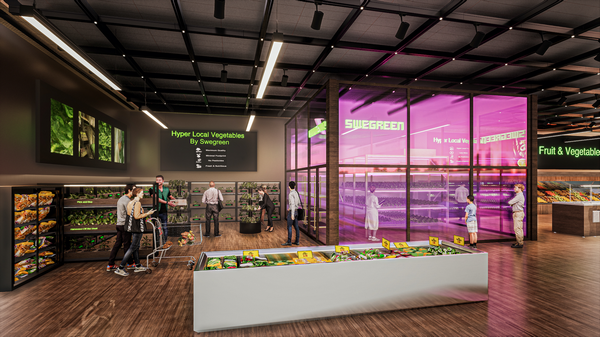Swedish AgTech rising star Swegreen, together with research partners RISE and Mälardales University, secures funding from Vinnova, for a 9,1 MSEK (approx. 880.000 euro) project aiming to develop further Swegreens’ platform for AI-driven vertical farming, and to evolve a digitalized supply chain from farm to fork.
The research partners Swegreen, Mälardalen University and RISE Research Institutes of Sweden, have teamed up together to digitalize the urban farming industry and restructure the urban food industry towards climate neutrality by help of Artificial Intelligence. The core for the partners research is Swegreens’ innovation for hyper-local vertical farming and building connected and circular models for integration of those facilities in host buildings.
The cluster started off earlier this year with the project ‘NeigbourFood’, funded with 2 MSEK by Swedish Innovation Agency Vinnova, to further develop a data-driven monitoring and optimization for precision farming in closed-loop indoor environment for Swegreen’s offer for Farming as a Service FaaS. The clusters' new project, called ‘AIFood’, has now been granted with 9,1 MSEK, corresponding to approx. 1 Million USD, to enhance the local and sustainable food production systems in urban environments with help of digital technologies.
"A data-driven approach on Vertical Farming has been Swegreens’ main focus from day one, and sustainability is embedded in our DNA as a greentech company," Andreas Dahlin, CEO of Swegreen, says. "Hand in hand with our technological development, our concrete collaboration with the leading research and academic institutions of Sweden gives us the upper hand to lead this industry’s development as a spearhead enterprise – and our partnership with RISE and Mälardalen University keeps our position on the edge of the development, globally speaking," Andreas Dahlin continues.

The call ‘AI in the service of the climate’ has been launched by the Swedish Innovation Agency Vinnova to support initiatives that focus on use of Artificial Intelligence for minimizing various industries' climate-negative impact. The agricultural and food sector accounts for 30% of the global GHG emissions, and vertical farming can create urban symbiosis as a key factor for resource efficiency and integration of farming facilities into urban infrastructure for significant global greenhouse gas emission cutback.
The ‘AIFood’ project runs for two years and focuses on a proof of concept for autonomous orchestration of vertical farming facilities modelling, and on development of an AI-based platform for precision farming, integration of vertical farms into host buildings and autonomous interaction of the production facilities with the after-harvest actors.
Dr. Baran Cürüklü, from Mälardalen University – a vibrant AI development academic center – is the Project Lead for the cluster. "AI can go beyond narrow and specific contributions. In this project, our aim is to demonstrate that complex and intricate systems can be orchestrated by AI, and contribute to rapid transition to a more sustainable agriculture, and even innovative services connecting the whole chain from producer to citizens," says Dr. Baran Cürüklü.
The project has a close collaboration with two other national project platforms as reference groups: Sharing Cities Sweden, a national platform for sharing economy with four testbeds in Stockholm, Umeå, Gothenburg and Lund and a cluster called Fastighetsdatalabb which focuses on data-related advancement of the real-estate sector.
Dr. Charlie Gullström, senior researcher at RISE, Sweden’s major research institution and head of Sharing Cities Sweden’s Stockholm testbed, plays an indispensable role in this project. She convenes an interdisciplinary climate panel connected to this project including household name researchers who focus on the climate aspect of the project. Dr. Alex Jonsson from RISE is another senior researcher that attends to the needs for the project from a technical perspective.
Dr. Gullström adds: "I believe that urban food production can speed up climate transition because it has potential to engage citizens in local consumption and circular business models that both reduce food waste and unnecessary transports. AI allows us to explore how to complement existing agricultural systems by actively involving stakeholders in the value chain as a whole. In this way AIFOOD really points the way to a new green deal."
Sepehr Mousavi, Chief Innovation Officer of Swegreen remarks: "We are proud of this collaboration with leading Swedish research institutions and researchers and see it as a successful model for how a private entity could collaborate with academia and offer its assets as research infrastructure for the good of the whole industry, in a planet and prosperity win-win model."
"This green transformation of the food sector is dependent on empowering factors such as innovation and circularity enhancement, a connectivity-based and data-driven approach through the whole chain; and application of Artificial Intelligence as an exponential enabler. Autonomous control of the vertical farming facilities for maximum resource efficiency, scalability and preciseness of operations is of extreme and fundamental importance for both the industry and our company to move forward," adds Sepehr Mousavi.

For more information:
Swegreen
Andreas Dahlin, CEO of Swegreen
andreas.dahlin@swegreen.se
www.swegreen.se
